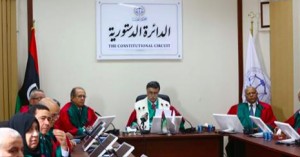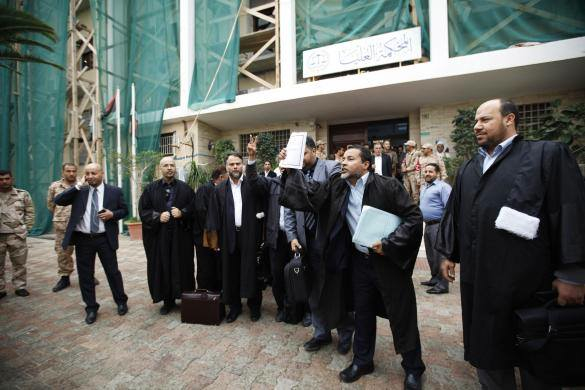By Libya Herald Reporters.

Tripoli and Benghazi, 6 November 2014:
Gunfire and jubilation in Misrata and Tripoli marked the Supreme Court’s televised ruling . . .[restrict]that the House of Representatives and the elections this summer, which brought it, into being are unconstitutional.
Meanwhile in Tobruk where the HoR is currently sitting and among pro-government forces fighting in Benghazi, the immediate response was that the judges had made their decision under duress.
Mohamed Hejazi, a Libyan National Army spokesman in Benghazi said that, just as the controversial Political Isolation Law had been passed by the old General National Congress “at gunpoint”, so the Supreme Court “took this decision in Tripoli which has been occupied by Libya Dawn terrorists”.
International law firm Clyde and Co, which has a practice in Tripoli, today pointed out: “The full legal reasoning and analysis behind the decision has not yet been released”. However it said that the ruling meant that “the meetings of the the recently elected House of Representatives in Tobruk are in violation of the 7th amendment of the Constitutional Declaration and are thus unconstitutional”.
The firm added: “This ruling, which has already been postponed twice, casts more uncertainty over the political environment in Libya … The medium/long-term implications of this decision remain to be seen, but it appears that either a new set of elections will need to be called, or the new Libyan constitution will need to be settled and ratified before any meaningful decision-making process can take place in Libya”.
There are unconfirmed reports that two of the supreme court judges resigned in the last 48 hours. This has produced claims that without its full panel strength of 13 judges, the Supreme Court could not rule. However a leading lawyer at Clyde & Co pointed out the the Libya Herald that the court can work with a majority decision. Moreover, when the same court ruled in favour of the validity of the GNC’s appointment of Abdullah Al-Thinni as interim prime minister, rejecting a challenge from Misrata businessman Ahmed Maetig, two judges were similarly missing when the decision was handed down.
It is understood that the Supreme Court concluded that the GNC’s February Committee, which prepared the law that brought about this June’s elections had violated Libya’s provisional constitution.
If this was the basis for the judges’ decision then it would appear to cast doubt over the GNC’s own subsequent vote accepting the February Committee’s proposals and its passage of the new electoral law.
Nevertheless, a spokesman for the rump of the GNC sitting in Tripoli welcomed the ruling.
A deputy president of the GNC, Salah Makzoum, said on Libya Al-Ahrar: “We are the only legitimate body in Libya. We thank the court for its decision and call on all Libyans to accept the decision and return to their jobs for the good of the country.
Abdussalam Jadallah Obeidi, the army chief of staff fired by the HoR said on Nabaa, that he was calling on the “Libya shields and the army to liberate Libya from terrorist gangs and target the camps of these terrorists – liberate the oil fields”.
The reactions from Tobruk were of puzzlement and anger. HoR representative for Benghazi, Jalal Al-Shweidi told this newspaper: “ I am surprised. We thought they were making a decision on the location of the HoR in Tobruk, not that the elections and all the decisions [the parliament has made] are illegal”.
He continued: “ The judgement was made under the threat of violence and a lot of militias were inside the court behind the cameras. The judgement has brought Libya into a dark tunnel and could drag the country into further violence”.
Another Benghazi representative Aisa Al-Araib wrote on social media “All the members of the House of Representatives are going to refuse the decision of the Supreme Court. The decision was the decision of the Libya Dawn gangs”.
[/restrict]








